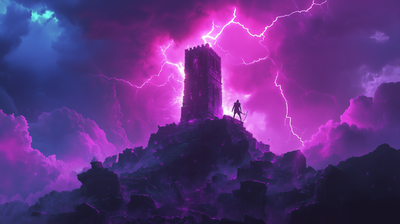Rebuilding the Site to Forge a Stronger and More Powerful Future

Change rarely happens without reason. For the longest time, I knew I needed to migrate this site from WordPress to Ghost, but sheer laziness, convenience, and habit kept me from making the move. The time had come to break that cycle. After years of loyalty to WordPress, I made the decision to leave it behind. The question is why. Why now, after nearly two decades? Why Ghost as the replacement? And why was this shift not just necessary, but inevitable?
Tokyo winters are a paradox. The air is crisp and dry, biting at the skin with an unrelenting chill, yet never oppressive enough to bring the relief of snow. The city moves in silence, the usual summer hum of cicadas and distant chatter replaced by the soft rustle of coats brushing against one another in crowded trains. The wind carries an emptiness, a sharp absence of warmth settling deep into the bones, making the indoors feel like the only refuge.
The cold has kept me inside, away from the city's rhythmic chaos, forcing my focus inward. The aroma of warm tea fills the air, contrasting the starkness outside, while the low hum of a heater provides an artificial comfort knowing the room will remain at a comfortable temperature. Yet, even here, in this self-imposed hibernation, something else has been gnawing at me, something beyond the season. It was time to make a change, one that had been lingering in the back of my mind for far too long.
The recent, and quite idiotic, WordPress drama finally gave me the push I needed.
The Final Straw
Matt Mullenweg’s recent antics on X have been a masterclass in self-inflicted damage. His public spat with WP Engine, his unbelievably condescending tone, his playing the victim card when nothing could be further from the truth, his insistence on controlling the narrative while disregarding valid criticism. These are not the actions of a true leader. They are the actions of someone desperate to cling to relevance. Watching his toxic behavior unfold was like witnessing a slow-motion car crash, with each word and decision revealing more about how WordPress has lost its way.
What made it even worse was his absolute refusal to step back, reflect, and acknowledge any missteps. Whether he was right or wrong in his grievances, the way he handled the situation was an utter disaster. A leader does not engage in petty, public back-and-forths alienating the very people who built their ecosystem. A leader does not belittle those they rely upon to keep their business afloat. A leader certainly does not allow their own ego to overshadow the product they are supposed to champion.
The lack of self-awareness was staggering. If this is how WordPress is being led, it is no wonder the product has become what it was today.

Two Decades of Loyalty
I have used WordPress for nearly twenty years. I have built sites with it, tinkered with it, broken and fixed it more times than I can count. In its prime, it was revolutionary, a platform empowering an entire generation of bloggers, professional writers, developers, and businesses alike. I still admire what it represents, and how it has become such a major part of the modern internet. However, admiration does not mean blind loyalty.
It pains me to speak ill of WordPress. This is a product I evangelized to countless people across the world, in conversations, in recommendations, in direct technical guidance. I introduced people to WordPress who still use it to this day. For years, I was one of its loudest supporters, constantly vouching for its flexibility, its ecosystem, and its value. Which is why this realization, this separation, is not something I take lightly.
Every passing year, WordPress has shown its age. It is no longer the nimble, elegant tool it once was. It is slow, cluttered, and increasingly unreliable. Plugins fight with each other like warring factions, updates introduce new problems, and every minor customization turns into an exercise in frustration. Instead of a platform built for content creation, it has become a platform built for maintaining itself. The focus has shifted from simplicity to survival, from usability to complexity. I always found myself tweaking things rather than focusing on what is most important: writing strong content.
The Gutenberg editor is the perfect example. In theory, a block-based editing system makes sense. It allows those with no technical skills to create visually appealing layouts with minimal effort. But in execution, it has been a disaster. Writing in WordPress used to be effortless. Now, it feels like a chore. The editor constantly interrupts the writing flow, forcing unnecessary friction into what should be a seamless experience. WordPress has prioritized ease of layout over the fundamental act of writing. And that is where it lost me.
The cracks in the foundation have been visible for a long time. I ignored them, out of habit, out of convenience, out of some misplaced nostalgia. But I have decided to break free from these shackles, and embrace modern technology.

Finding Something Better
Ghost is everything WordPress forgot how to be.
I already knew the power of Ghost. I am using it on two other projects of my own. Most importantly, Praeryx, the enigmatic cyber threat intelligence startup I co-founded, runs on Ghost. I also use it for Saiklr, a web site I created to catalog my health, fitness, and cycling journey, even though I had been rather delinquent in updating in for two years. Nevertheless, Ghost is not unfamiliar to me. I know what it can do, and I know how seamless it makes writing amazing content.
Where WordPress has layered itself with unnecessary features, Ghost has stripped away the noise, leaving only what matters. The writing experience is unmatched. The Koenig editor interface disappears when needed, allowing pure focus on words, yet beneath its minimalist surface lies a powerful, extensible system that does not get in its own way.
From a technical perspective, Ghost is superior in every way. The founders have a clear vision, but more importantly, they listen. Rather than blindly throwing in new features and creating bloat, they have carefully and deliberately considered the future of the platform. Every feature is introduced with purpose. Every addition is intentional. There is restraint, something WordPress abandoned long ago.
The platform is already blindingly fast, yet theme developers work tirelessly to ensure their designs do not introduce unnecessary weight. The result is a tool loaded with insane speed, where performance is never compromised. Ghost respects its users by making performance and writing a priority, rather than an afterthought. It is built for creators, not for an ecosystem demanding endless plugins just to function properly.
Within minutes of being reintroduced to Ghost by getting back to writing on Saiklr, I knew this was where the site belonged. The difference was immediate, the contrast impossible to ignore. This was not just a platform shift. It was an upgrade in experience, in efficiency, in intent.
The newly rebuilt site is more than just a migration. It is a deliberate and purpose-driven transformation, designed to showcase my work, thoughts, and experiences in a way truly reflecting my vision. But beyond aesthetics and functionality, there is something far more important.
Ownership.
Every word written here belongs to me. Not to Meta. Not to X. Not to some faceless corporation profiting from user-generated content while dictating what stays and what goes. The data, the content, the insights shared here are mine and mine alone. This is more than just preference. It is about control, autonomy, and the fundamental right to own what I create.
In a constantly increasing digital world where major platforms thrive on harvesting data, manipulating reach, and rewriting the rules at will, true independence is rare. By hosting my content here, I eliminate the risk of being at the mercy of annoying and opaque algorithms, arbitrary policy changes, or deplatforming. This site is a space free from interference, where my words remain unaltered, unfiltered, and exactly as I intend them to be.
More importantly, my content is no longer wrapped in garbage. It does not sit beside hate speech, misinformation, or the endless drivel of mindless idiots who exist only to troll. There are no bad-faith arguments flooding my feed, no corporate manipulation dictating what gets engagement, no engagement bait designed to stir outrage. The conversations here are mine to create, mine to guide, and mine to shape with actual purpose.
That, more than anything, is why this shift matters.
Site Features
The front page now features a detailed introduction into who I am, providing a clearer sense of my expertise at a glance. At the bottom of the front page there is a timeline of my major roles, outlining key positions I have held throughout the years. The About page has been significantly expanded, offering a deeper look into my background, experiences, and the journey shaping my life and career.
The blog remains a core feature. It is the space where I write extensive articles like this, diving deep into topics mattering to me. Thought leadership, industry insights, personal reflections, and everything in between will continue to be explored here. While I used to write, I rarely posted on this site because as mentioned, the Wordpress experience hindered writing for me. That all changes moving forward.
A new addition to the site is Ping, my very own Bluesky or X clone built directly into the platform. It is designed for quick updates requiring little thought, a space for rapid-fire commentary, observations, and musings. It is the perfect medium for sharing insights without the overhead of a full-length blog post.
The Books section is another work in progress. It lists some of my most treasured reads, covering a wide range of subjects shaping my thinking. While it now contains some books I am currently reading, and a history of previous works, it is only about one-third complete. Once done, I will mark it as finished through a Ping update.
For now, there are no dedicated photo galleries, as I am still conceptualizing how I want to approach picture sharing. The format and presentation need to be done right, and I have not yet settled on the best way to display my photography in a way aligning with the rest of the site’s design and purpose.
While I do use Instagram, and am toying with Pixelfed, I would love to get away from those mainstream platforms. Social media is a scourge, and I am limiting both my consumption and contributions.
This is just the beginning. The site will continue to evolve as I refine its content and functionality, ensuring it remains an extension of my vision and purpose.

Conclusion
Leaving WordPress felt like stepping out of the cold. For years, I wrapped myself in layers of unnecessary complexity, convincing myself the weight was necessary. But the moment I stripped it away, the moment I let Ghost take over, everything became clear.
A huge weight was lifted.
The air was lighter. The process was faster. The purpose was sharper.
Matt Mullenweg's actions may have been the catalyst, but the reality is WordPress had been pushing me away for years. Bloated, sluggish, tangled in its own ecosystem, WordPress, both as an open source tool and a paid service, has strayed too far from what made it great. It has not been the industry-leading blogging software it once was in its heyday for a very long time.
Meanwhile, Ghost thrives. It does not burden itself with unnecessary features, it does not compromise performance, it does not lose sight of what it was built to do. It is a platform serving its users, not one expecting its users to serve it.
Some systems outgrow their utility. Some leaders lose their vision. And sometimes, holding onto the past is just another way of refusing to step into something better.
WordPress was the old winter coat I kept wearing, even as the fabric thinned and the warmth faded. Ghost is the fire I should have been standing beside all along.
Socrates once said, "the secret of change is to focus all of your energy not on fighting the old, but on building the new." Clinging to outdated systems, no matter how familiar, only slows progress. True evolution comes from embracing what is better, more efficient, and built for the future.
This shift was never about rejecting the past. It was about recognizing what once worked no longer serves its purpose. The focus is no longer on maintaining something broken, but on building something stronger.
The future is not found in what was, but in what comes next.





